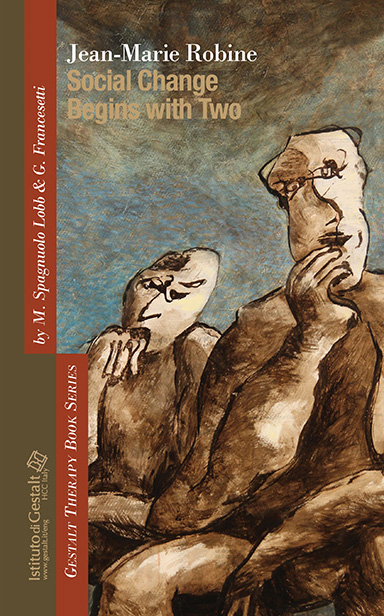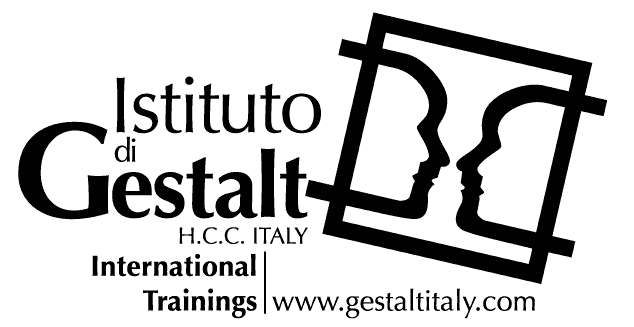
Social Change Begins with Two
by Jean-Marie Robine
Citation: Robine, J. M. (2015). Social Change Begins with Two. Siracusa (Italy): Istituto di Gestalt HCC Italy Publ. Co.
Back Cover
Social Change Begins with Two is a collection of published and unpublished essays and conference lectures prepared by Jean-Marie Robine over the last ten years. Its release is a unique opportunity to be taken on a tour of his thought over the decade and its developments in areas ranging from philosophical issues to social concerns, clinical insights to political perspectives, without ever losing focus of Gestalt therapy, the thread unifying the collection. Following the author in his line of thought, readers can learn how Jean-Marie has explored some of the topics most dear to him, in which his insights have become key contributions over the last ten years to debate in the international Gestalt community. Robine is one of the most prominent theorists on the contemporary Gestalt therapy scene. For years he has developed a discourse that is firmly rooted in the epistemology of the paradigm, bringing forth new, stimulating figures that are a creative inspiration for his students and readers.
This book is a precious contribution to the Gestalt therapy community not only for the contents it conveys, but as an example of a paradigmatic model of inquiry—of how to develop Gestalt therapy theory and practice by drawing from various grounds and like-minded disciplines and channeling it all into the practice of psychotherapy and stimulating new thought, without ever losing the rigor of our foundational epistemology. The deliberate non-systematicity of the paths presented leaves matters open rather than closing them, encouraging readers to explore the outlines and suggestions provided by the author, in what is a rather effective way of not precociously closing the horizons that these pages throw open.
Buy now
Discounted book price: 34 Euro
Contents
Foreword
Acknowledgements
Preface, by Gianni Francesetti
Part I—Backgrounds
- The Self of the Situation 1. Self as Unfolding 2. Self in Situation 3. In the Situation, Illuminating Intentionality 3.1. Saying What Is Felt 3.2. Intuition 3.3. Encountering Another Intentionality 3.4. The Other Affects Me 3.5. Conscious and Non-Conscious Intentionality 4. Provisional Conclusion
- A Therapy of Forms of Experience 1. Contact 2. From Feeling to Experience: the Body 3. The Field and the Situation 4. Temporality 5. Form and the Formation of Forms 6. An Example of the Formation of Forms: Emotion
- Another Example of Form: the Symptom 8. Conclusion: Psychotherapy as an Aesthetic
- Contact, at the Source of Experience 1. Pre- 2. With 3. Contact as Awareness 4. A Figure/Ground Relation
5. Inflexions of Contacting 6. About Contact at the Contact-Boundary 7. Post - Does the Now Have a Future?
- A Background To “The Field” 1. Field or Field of… 2. Organism 3. A Self/World Field? 4. Organism/Environment Contact 5. The Field of Consciousness and the Organism/Environment Field 6. Conclusions for Therapeutic Practice: What Does It Mean To Practice Within a Field Paradigm?
Part II— Clinical Findings
- Gestalt Therapy “and” Psychopathology. Nine Proposals for Approaching This “and”
- Shame 1. The Phenomenon of Shame 1.1. The Shame Which Reveals, the Shame Which Hides 2. The Gaze of the Other 2.1. The Gaze of the Other Represents the Gaze of the Community 3. Shame as a Warning System and Regulatory System 4. Shame and Guilt 5. Consequences for the Psychotherapeutic Situation
- Notes on Fear and Faith
- Shame in Supervision 1. Shame as a Phenomenon 2. Shame in Psychotherapy 3. Under Psychotherapeutic Supervision 4. Orthodoxy 5. The Supervisor’s Knowledge 6. Self-Esteem 7. The Psychotherapist’s Shame / The Patient’s Shame 8. Defensiveness 9. Conclusion
Part III—Forms
- Gestalt Therapy as Aesthetics 1. An Aesthetics of Contact 2. An Aesthetics of the Ephemeral 3. An Aesthetics of Gestaltung 4. An Aesthetics of Reworking 5. An Aesthetics of Standing Aside 6. …And This Brings Us to Interstices
- An Aesthetics of the Situation 8. The Aesthetic Paradigm in Psychotherapy
- Therapy of Forms and Forms of Therapy 1. A Relocation of the Psyche 2. What Happens in This “In Between”?
- The Therapy of Forms 4. What Is a Form? 5. Form or Formation of Forms? 6. A Formation of Forms: Emotion
- Another Example of Form: the Symptom 8. Conclusion: Psychotherapy as an Aesthetic
- “Structions” 1. Deconstruction in Therapy 2. Deconstruction as Therapy 3. Deconstruction of Therapy 4. Constructing
- The Language of Experience 1. And the Flesh Became Word 2. For, And, Nor, But, Or, Yet, So 3. Is Non-Verbal Experience Linguistic? 4. Conclusion: Experience or Meaning?
- Expression Insists, Impression Exists: A Topic of Experience 1. First Proposal 2. Second Proposal 3. Third Proposal 4. Fourth Proposal 5. Fifth Proposal 6. Sixth Proposal 7. Seventh Proposal 8. Eighth Proposal 9. Ninth Proposal 10. Tenth Proposal
Part IV— Being-With
- Self-Disclosure as a Gestalt Therapist 1. In Whose Service? 2. Twisting Figures 3. Contact or Relationship?
4. Engaged in the Situation - Social Change Begins With Two 1. Which Reality? 2. Some Consequences for Psychotherapy 3. The Therapeutic Relationship Models Social Change 3.1. Spontaneity 3.2. The Middle Voice 3.3. Engaged with the Situation 4. A Few Other Aspects of our Method 5. Conclusion
- Social Implications of Gestalt Therapy 1. Egotism 2. Disengagement and Disempowerment 3. The Reduction of the Social to the Psychological 4. What Depends on Us 4.1. Identity Construction 4.2. Access to the World Lived by an Other 4.3. Intersubjective Relationship, Connection, Belonging…5. An Essential Social Act: Recognition
- What I Believe… and What I Believe I Believe 1. Decentralizing 2. Situating 3. Thinking 4. Constant Indissociation and Differentiation 5. Apparatus 6. Experiencing 7. Several Elements of the Position I Believe In 7.1. Openness
7.2. Non-Judgment 7.3. Engagement, Involvement and Disclosure 7.4. Tenderness 7.5. Asceticism of the Now
7.6. Faith 7.7. Desire or Eros? 7.8. Ethics Conclusion Next Paths To Be Explored…
- The Man of the Situation
References
Jean-Marie ROBINE is a clinical psychologist since 1967, Gestalt-therapist and trainer. Founder and past director of Institut Français de Gestalt-thérapie (1980-2007), co-founder and past-president of European Association for Gestalt Therapy, full member of New York Institute for Gestalt Therapy. Jean-Marie was a student of Isadore From, who was among the founders of Gestalt Therapy. International trainer, author of many articles and 7 books about Gestalt Therapy. His previous book « On the Occasion of an Other » has been translated into 7 languages.

